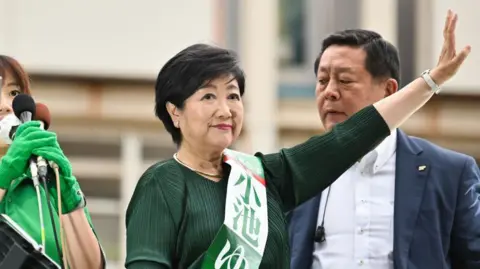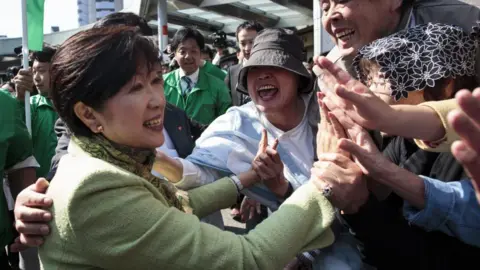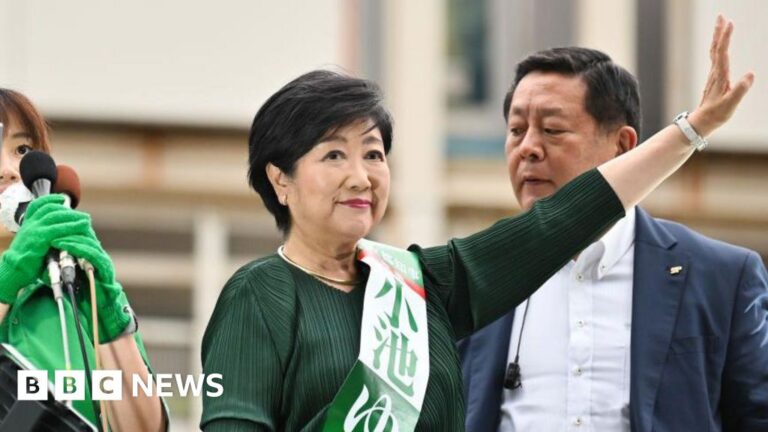By Toby Luckhurst, BBC News, London
 Getty Images
Getty ImagesTokyo Gov. Yuriko Koike is certain to win a third consecutive term in Sunday’s gubernatorial election, exit polls show.
The first female governor of Japan’s most populous city, aged 71, will hold on to her post for another four years.
Her victory will come as a relief to Prime Minister Fumio Kishida and his Liberal Democratic Party (LDP), who backed the 71-year-old to win a third term.
She was elected in 2016 and won her second term in 2020. The conservative governor successfully guided the city through the coronavirus pandemic and the postponement of the 2021 Summer Olympics.
Japan’s falling fertility rate has become a major campaign issue, and the winning candidate will now have to work hard to improve Tokyo’s incredibly low birth rate. At 0.99 – less than one child per woman aged 15 to 49 – it is the lowest of any region in the country.
Her appointment makes her one of the most powerful women in Japanese politics – Tokyo accounts for about 11% of the population and contributes nearly 20% of the country’s total GDP.
It also gives him responsibility for the city’s budget, which reached a staggering 16.55 trillion yen ($100 billion; £80 billion) this financial year.
Ms Koike, 71, won more than 40 percent of the vote, according to Reuters.
Unexpectedly, Shinji Ishimaru, 41, a former mayor of a city in Hiroshima Prefecture, came in second, a position long thought to be assured for Renho Saito.
Ms Renho, 56, backed by the Constitutional Democratic Party of Japan (CDPJ), came in third.
Mr Ishimaru’s success is likely due to mobilising young voters through a large online audience. His campaign has also focused on developing Tokyo’s economy and industry.
Who is Yuriko Koike?
Yuriko Koike began her career as a journalist, working as a television news anchor before entering politics in the early 1990s.
But it wasn’t until 2016 that she gained national prominence when she won the Tokyo governorship for the first time. She wasn’t the official LDP candidate, but still managed to win comfortably, garnering more than 2.9 million votes to become the first woman to hold the post.
“I will lead Tokyo politics in an unprecedented way, a Tokyo you have never seen,” Koike promised her supporters on election night.
She officially left the LDP in 2017 to form her own political party, although she retains the support of many party members – who backed her in the 2024 race.
 Getty Images
Getty ImagesKoike pledged to focus on local issues during her term, including tackling overcrowding on public transport and the city’s culture of overwork. But it was global issues that dominated her tenure.
The emergence of Covid-19 forced Tokyo to postpone its Summer Olympics, scheduled for 2020. Ms Koike won a second term that year after her successful handling of the pandemic, and won further praise for managing the delayed Olympics, which were held in the city in 2021 in the shadow of the coronavirus.
Mrs. Koike, But she has not escaped scandal. An allegation that she never graduated from Cairo University – first reported during her first term – has never really gone away. Despite her repeated denials and a statement confirming that she had graduated from the university itself, rumors that she had falsified her graduation documents persisted during her bid for a third term as governor.
His opponents also criticize him for failing to deliver on his promises in Tokyo. Trains remain crowded and the culture of overwork remains a problem, they say.
Among the 56 candidates from which voters had to choose, Renho Saito was expected to be Ms Koike’s main opponent.
The former upper house member was supported by the main opposition Constitutional Democratic Party, as well as the Japanese Communist Party and the Social Democratic Party.
Ms Renho left the CDP before the campaign officially began on June 20. She lost her seat in the upper house when she filed for reelection.
 Getty Images
Getty ImagesShe took over as leader of the centre-left group in 2016, becoming its first woman leader, but resigned a year later due to poor results in Tokyo prefectural elections.
Japanese media portrayed the race as a proxy war between national parties, with the conservative incumbent being challenged by a left-wing opposition politician.
The gubernatorial election took place amid a general climate of distrust in politics. Critics blame Japan’s economic woes, the end of a long historical period of deflation and the weakening of the yen.



